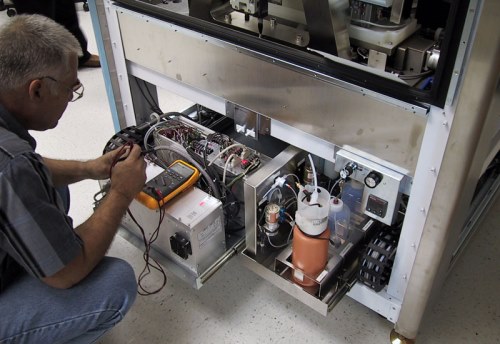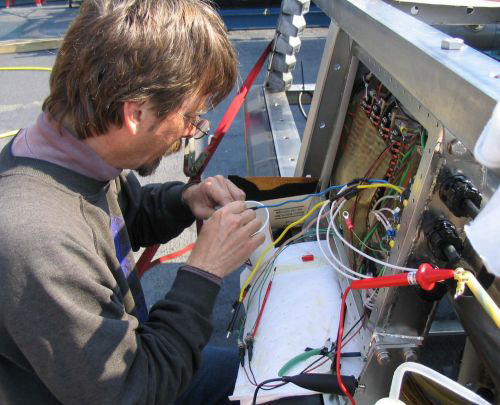Every career path presents challenges. Author Scott Adams once said, “Engineers like to solve problems. If there are no problems handily available, they will create their own problems.”

Typical EE job, testing the circuit board for faults. (Image via Engineering Career Planning)
So if you’re getting ready to embark on your engineering education or career, these challenges shouldn’t scare you off too much.
Here are 10 of the biggest challenges and problems engineers have encountered in the course of their careers.
1. Need for continuous education
David Brady, Professor, Imaging and Spectroscopy, Duke University:
I have always had to work to keep learning new things. Engineering is always changing and one has to keep fresh skills.
Martin Brooke, Associate Professor, Duke University Department of Electrical and Computer Engineering:
Outsourcing of engineering work overseas and the need for continuous education have radically changed what engineers in the USA do. Engineers need to be prepared to change around what they do and learn new skills at any age.
2. Managing frustrations
Hal Babb, Lockheed Martin Fellow, Lockheed Martin:
Not enough time, talent, or money to pursue the dreams of the time.
3. Make sure you listen to your peers
Pamela Bhatti, Assistant Professor, Georgia Tech:
I am very application oriented and sometimes different from my peers. That being said, it’s important to listen to your peers and get along — they often have something very useful to say and want to work with you.

Power industry career. (Image via Tennesse State University)
4. Determining a career path
Carter Burks, Senior Electrical Engineer, Lockheed Martin Missiles and Fire Control:
Each new role has required me to constantly reassess where I’m going and where I want to be five years from now.
Indira Negi, New Devices Group, Intel Corporation:
A role that wasn’t well matched with my skills and interest…slowed down the pace of my growth. It is really important to find a job that you love, or at least really like.
5. Profound responsibility
Jatin Mehta, Senior Electrical Engineer, Lockheed Martin Missiles and Fire Control:
You quickly find yourself working long hours and working on weekends, and it becomes a challenge to achieve a good work-life balance.
6. Communication
Gisele Bennett, Director of Electro-Optical Systems Laboratory, Georgia Tech:
Communication skills between engineers and scientists are sometimes challenging. My advice is to be as clear as possible in communicating.
7. Coping with rejection
Amanda Foo, Propulsion Manager, Lockheed Martin:
My biggest obstacle was overcoming the expectation that hard work equals rewards and recognition .
How to combat this:
Determine what you’re doing wrong; ask for feedback, and change.
Abigail Kuchan, Lockheed Martin Engineer:
One major challenge was learning how to cope with rejection — not being selected for a job or having my ideas turned down — while continuing to put my best foot forward.

Assistant electrical engineer at work. (Image via electricalengineerjobs.org)
8. Job transitions
Phil Cheng, Systems Engineer, Lockheed Martin:
Transition means having to adapt to new people, learning new skills and possibly a change in work location. Adjusting can be a challenge, but it gives the engineer a chance to learn about an area they might never have known about and to develop new mentors.
9. Being a female
Abigail Kuchan, Lockheed Martin Engineer:
Being the only female in a group of men is a challenge, but it’s important to realize that people who don’t respect you because you are a female are the exception and not the rule.
Not all women feel gender is a challenge:
Julie Kramer , Orion Chief Engineer at NASA, says she was very lucky because when she came on-board at NASA 27 years ago, she was taken under the wing of “the old Apollo guys” that treated her really well and no different just because she was a woman. According to Kramer, NASA is more concerned with “who’s best for the job,” not gender.
She does admit that several of her colleagues in engineering school felt they were treated differently because they were women, though.
10. School vs. Real world
Brian Foy, Lockheed Martin Engineer:
Engineering in the classroom is very different from engineering at work. The problems you solve at work do not have one well-defined, universally correct answer.
What challenges have you come across that should be on the list? Tell us below.
Related Articles:
Advertisement
Learn more about Electronic Products Magazine





